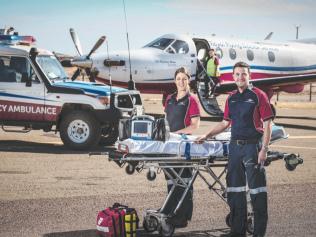Quality care in the middle of nowhere
THE RFDS Base at Port Augusta is delivering top-notch medical services to rival those more commonly found in major cities.

THE RFDS Base at Port Augusta is delivering top-notch medical services to rival those more commonly found in major cities.
When your nearest doctor is 1000km away, staying on top of blood pressure checks, vaccinations or cervical screenings can be a challenge.
But that's changing
for residents of South Australia's remote Outback communities, thanks to a new primary and preventative health care model delivered from the RFDS Port Augusta Base.
Under the model, patient records have been transferred to an electronic software system known as Best Practice, making it easier for the RFDS to look up and update patient details, as well as issue reminders and follow-up notices.
Going digital is just one of the changes imple- mented in the wake of an RFDS-commissioned Consumer Health Needs Analysis Report in 2014 – changes that have brought the Port Augusta Prima- ry Care Service in line with Royal Australian Col- lege of General Practitioners (RACGP) standards in its ability to match services offered by any metro- politan GP practice across Australia.
back nurse Cheryl Boles as practice manager and replace her full-time role with two part-time specialists: a midwife and community health nurse and chronic disease nurse. They were joined last year by a mental health nurse and general practice nurse funded by the SA Country Primary Health Network (PHN) as well as a breast cancer nurse sup- ported by the McGrath Foundation.
The Port Augusta base was set up 63 years ago and covers an area of 840,000sq km, from the Flinders and Gawler Ranges to the Birdsville Track, the West Coast, North East Pastoral District and Far North, stretching as far as the WA border.
Boles says most people think of the Flying Doc- tor as being there in case of emergency, but primary and preventative health care services are just as important.
“We wanted to look at how we could provide pri- mary health care that was equal to or even better than any metropolitan service and that was con- temporary and relevant into the future,” she says.
Under the new “point of care testing” system, doctors and nurses can access live patient records from portable laptops at fly-in clinics. Patients can be tested for chronic conditions such as diabetes or cardiovascular disease at a clinic and receive im- mediate results. Referrals and documents can be printed on site, cutting out travel time.
As well as services offered at the Port Augusta Base, doctor and nurse teams conduct fly-in clinics across the region. They offer ambulance services and a 24/7 Telehealth service, providing telephone consultations. Medical chests are kept at remote sites in cases where pain relief or medications are needed quickly.
Working in the Outback is not without its chal- lenges. Some properties rely on generators for their power supply and don’t have a reliable internet connection.
“We have to make sure all the batteries are charged before we head out, and sometimes work offline,” Boles says. “We need to make sure that we have resources available that would be at your fin- gertips in a city practice.”
Harsh Outback conditions also create a challeng- ing work environment.
“Sometimes we use the aircraft to conduct a clin- ic and there are flies, it’s dusty and it’s over 40 de- grees,” Boles says. “We carry vaccines that are very fragile and need to kept at between two and eight degrees for up to 12 hours in the heat, so we need to prepare and pack a cooler.”
Boles says that, while the RFDS is evolving, some things never change.
“We know the bush; we’ve been partnering with people who live here throughout our 90-year his- tory. There’s a culture of understanding that, as modern-day workers, we are ambassadors of a very important and special service, and that’s taken very seriously by all of us.”
Originally published as Quality care in the middle of nowhere


